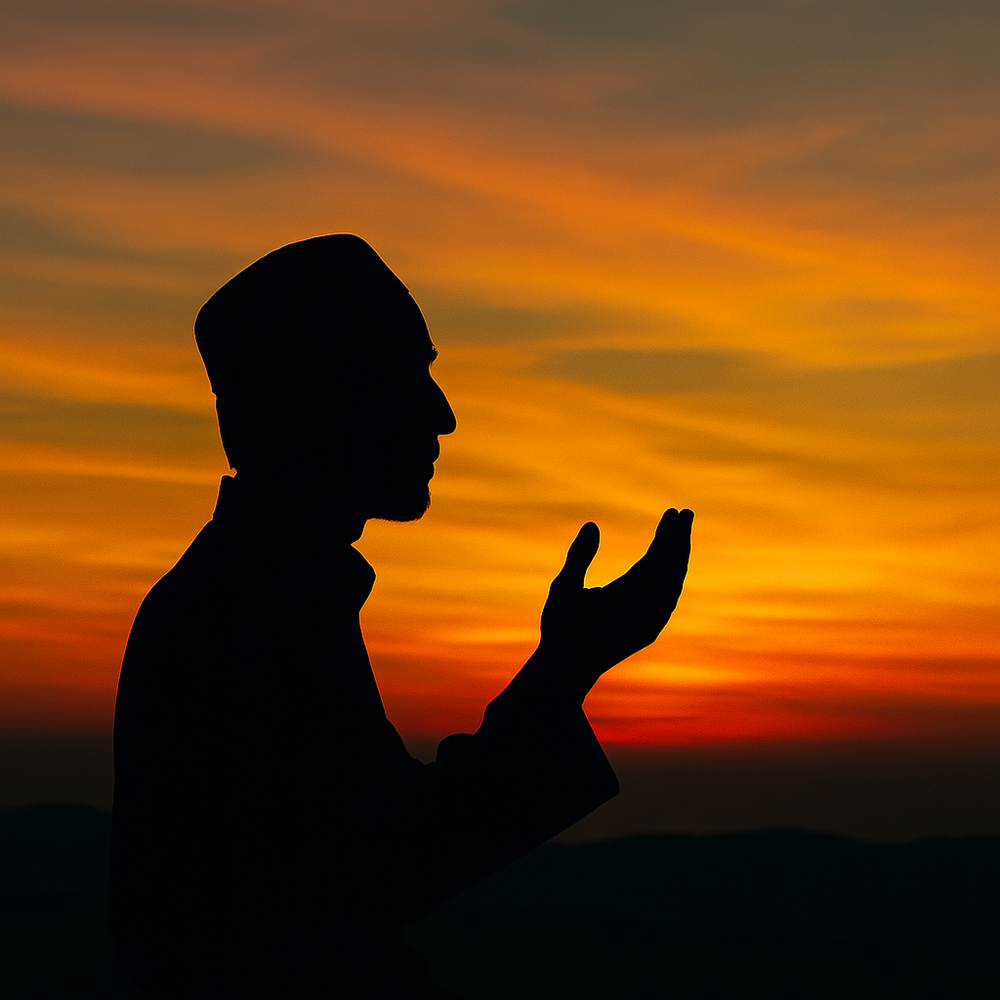Introduction: What Is Du‘ā and Why Is It Important?
A human being has both material and spiritual layers. The body is nourished by food, and the soul is nourished by prayer (du‘ā). Just as we drink water multiple times a day, the soul also needs prayer. Du‘ā is not merely a request—it is a connection, an invisible thread between a person and their Lord. Every prayer is an attempt to speak with the Creator—sometimes in words, sometimes in silence, or even with a single gaze.
Du‘ā is the most natural state of a person. Like a child calling out to their mother, in moments of hardship, joy, fear, or hope, we listen to that inner voice and call out to Allah. Du‘ā even comes before formal worship, because it is the voice of our fitrah (innate nature), a fundamental need placed within us at creation.
I. Prayer—Wordless Dialogue and the Whisper of the Soul
Often, du‘ā begins silently. Before raising one’s hands, the heart may already be open. Eyes fix on a point, breathing deepens, time seems to stop—and the silent du‘ā starts—the place where words fail but the heart whispers. In Islam, such deep silence is highly valued. Allah says:
“Invoke your Lord humbly and secretly...” (al-A‘rāf 55)
This means that the value of prayer is not measured by volume but by the depth of the heart. Sometimes we can’t find any words, yet tears well up. Those tears may be more powerful than a thousand prayers. Because Allah hears even our tears.
Silent du‘ā is often the strongest form of communion with Allah. In that moment, there may be no spoken words—but the submission of an entire life.
II. Du‘ā in the Qur’ān—Lessons for Life
The Qur’ān is not only a book of rulings, but also a book of emotions. It contains many examples of du‘ā addressing various life situations:
-
The du‘ā of Yunus (Jonah),
“There is no deity except You; exalted are You. Indeed, I have been of the wrongdoers.” (al-Anbiyā’ 87) -
The du‘ā of Zakariyyā (Zachariah): a sincere plea for a child, answered with the gift of Prophet Yaḥyā (John).
-
The du‘ā of Mūsā (Moses):
“My Lord, expand for me my breast…” (Ṭā Hā 25)
These prayers teach us that, no matter how great our need or how small we feel, Allah hears every supplication.
III. Lessons from the Prophets’ Du‘ā
Prophets were chosen, yet they faced immense challenges. They overcame them through du‘ā:
-
Ibrāhīm (Abraham) in the fire,
-
Yūsuf (Joseph) in prison,
-
Ayyūb (Job) during illness,
-
Muḥammad (ﷺ) upon losing loved ones.
Their prayers teach us:
-
Du‘ā is surrender.
-
Du‘ā is hope.
-
Du‘ā is steadfastness.
-
Du‘ā is a source of Allah’s strength when our own is depleted.
IV. Du‘ā in the Age of Technology—Preserving the Spiritual Connection
Technology has brought us closer to the world but can distance our souls. People often say, “I don’t have time to pray.” But du‘ā can happen in seconds—a glance, a heartbeat, a whispered “Allahum.” That is enough.
Today, du‘ā is like Wi‑Fi: no matter where you are, the connection is available. Its speed never weakens. Du‘ā offers moments of pause, reflection, and a return to the question, “Who am I?” In those moments, you are not alone—your Lord is silently listening.
V. Acceptance of Du‘ā and Its Wisdom
Many say, “I prayed, but nothing came of it.” Oftentimes, this stems from unrealistic expectations.
The Prophet (ﷺ) said:
“Allah responds to du‘ā in three ways: He grants the request, He averts harm from you, or He preserves reward for you in the Hereafter.”
So du‘ā is always answered—but not necessarily in the form we expect. Du‘ā is trust in Allah: “Give me what’s good even if I don’t ask, and withhold what’s harmful even if I request it.” Moreover, du‘ā often transforms us from within—softening hearts and drawing us closer to Allah.
VI. Timing, Setting, and State of Du‘ā
Certain times, places, and conditions enhance du‘ā, although it can be made at any moment. Moments of heightened acceptance include:
-
During prostration (sujūd),
-
Early morning and evening hours,
-
When rain begins,
-
At the sacrifice of an animal,
-
When the oppressed pray,
-
At the time of breaking fast.
These moments are doors to the depths of the heart—but sincerity is the key element in every du‘ā.
VII. Du‘ā as the Inner Spiritual Journey
Du‘ā is not only turning to Allah but also an inward journey. In du‘ā, we confront our struggles, desires, fears, and shortcomings. In seeking forgiveness, we learn to forgive ourselves. Du‘ā initiates the soul’s inner evolution.
Spiritual purification needs only the water of ablution, tears, and sincere prayer.
Conclusion: Living Through Du‘ā
Du‘ā is not merely worship—it is a way of life. Sharing every joy, sorrow, and decision with Allah is living with prayer.
Du‘ā is most beautiful not only at times of trial but also in peace, happiness, and victory. Our Lord is not only the Lord of hardship but also the Lord of everyday blessings.
Final Thought:
Your Lord hears even your softest whisper. Pray—and believe!

